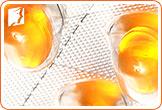
There are many ways to treat hormonal imbalance during menopause, most of which are non-hormonal. They fall into two categories: lifestyle changes and herbal remedies.
Lifestyle Changes
There are many dietary and lifestyle changes you can implement to treat the physical and emotional symptoms of menopause. For the emotional symptoms of menopause - mood swings, stress, anxiety, and irritability - the following can help calm your state of mind:
- Breathing exercises
- Yoga
- Meditation
Maintaining a healthy diet helps with physical menopausal symptoms, including hot flashes, vaginal dryness, brittle nails, and gum problems. Make sure that you:
- Eat plenty of fruits and vegetables
- Drink 8 glasses of water a day
- Consume foods rich in vitamins B, C, D, and E
- Incorporate soy into your diet
Finally, the following will address any sleep-related problems you are having due to menopause. Try the following to fight insomnia, night sweats, fatigue, and other sleep disorders:
- Avoid caffeine and alcohol
- Make sure you have at least 7 hours of sleep
- Exercise every day at least for 30 minutes, five times a week
Herbal Remedies

Estrogenic herbal supplements can be an effective, non-hormonal way to treat menopause symptoms. Estrogenic herbs contain phytoestrogens, which are natural substances with estrogen-like properties. They can help balance the hormones causing menopause symptoms. The following are all examples of estrogenic herbs that are available in supplement form:
- Ginseng
- Black cohosh
- Dong quai
Soy also has estrogenic properties, so you can incorporate the following into your diet:
- Soy milk
- Tofu
- Soy flour
Non-hormonal treatments can be an effective way to treat menopause symptoms. They do not share the risks that are associated with hormone replacement therapy treatments or certain medications, and can be easily incorporated into your daily routine by making lifestyle changes. Click on the following link to find out more about non-hormonal options that are available to treat menopause symptoms.
Sources
- BMJ Group. "Menopause: What is it?" Patient Leaflet. 2007.
- Hopkins, Virginia. Lee, John R. M.D. What Your Doctor May Not Tell You About Menopause. New York: Warner Books Inc., 1996.
- Love, Susan M.D. Menopause and Hormone Book. New York: Three Rivers Press, 2003.
- Martin, Raquel. The Estrogen Alternative. Rochester, VT: Healing Arts Press, 2000.



